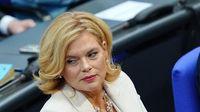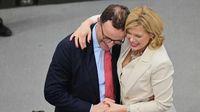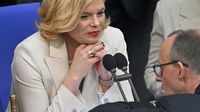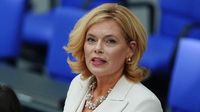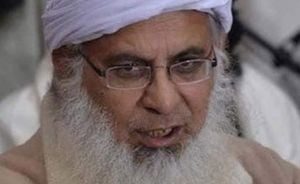In a recent interview, Bundestagspräsidentin Julia Klöckner (CDU) sparked significant controversy by criticizing the political engagement of churches in Germany. Klöckner, who has only recently taken office, suggested that churches should focus more on their pastoral roles rather than getting involved in political issues. Her remarks have drawn sharp criticism from various political factions, including her own party.
During her interview with "Bild am Sonntag," Klöckner expressed that churches are becoming too much like non-governmental organizations (NGOs) by frequently commenting on current political themes. She stated, "Klar kann sich Kirche auch zu Tempo 130 äußern, aber dafür zahle ich jetzt nicht unbedingt Kirchensteuer" (Of course, the church can also comment on a speed limit of 130, but I don't necessarily pay church tax for that). Klöckner emphasized that instead of engaging in daily political discussions, churches should provide stability, meaning, and spiritual guidance, especially during challenging times like the COVID-19 pandemic.
Klöckner's comments came on the heels of her decision to let the Bundestag session in April fall out, which also attracted criticism. Many in the opposition, including members of the Green Party and the Left Party, expressed disappointment that they were not given a platform to discuss the ramifications of the market turbulence instigated by U.S. President Donald Trump. They felt that Klöckner could have supported a plenary session to address these pressing issues.
In her interview, Klöckner lamented that the church does not always provide the answers people need, particularly during the pandemic. She mentioned that churches could have offered more stability and support, saying, "Ich glaube, an der einen oder anderen Stelle hat sie wirklich eine Chance verpasst" (I believe that in one way or another, it really missed an opportunity). This sentiment was echoed by others who believe that the church should focus on core issues of life and death rather than transient political matters.
Responses to Klöckner's statements were swift and critical. Bremen's Mayor Andreas Bovenschulte (SPD) pointed out on social media that churches have always engaged in politics, particularly conservative politics, and that calls for political abstinence arise only when their views diverge from conservative stances. Green Party co-chair Britta Haßelmann echoed these sentiments, stating that the Union is currently not showing openness to critical civil society. She articulated, "Warum sollten sich die Kirchen nicht äußern zu Ungerechtigkeiten in der Welt, zu Humanität und Menschlichkeit, zum sozialen Zusammenhalt und zur Nächstenliebe?" (Why shouldn't churches speak out against injustices in the world, for humanity and kindness, and for social cohesion and love for one’s neighbor?).
From within her party, Klöckner faced pushback as well. Dennis Radtke, the head of the CDU's social wing, expressed his discomfort with Klöckner's remarks, stating, "Ich finde es maximal irritierend, dass wir meinen, wir hätten das Recht, die Kirchen zurechtzuweisen" (I find it extremely irritating that we think we have the right to rebuke the churches). He underscored that the core mission of the church is to preach the Gospel and that churches have the right and duty to speak out when they feel that their messages conflict with political issues.
Ralf Stegner, a member of the SPD, criticized Klöckner’s comments as an example of authoritarian admonishment, suggesting that he would have preferred a recognition of the churches' role in society rather than a call for them to remain silent. He stated, "Die Stimme der Kirchen für Frieden und Gerechtigkeit dürfte ruhig häufiger, unbequemer und lauter zu hören sein" (The voice of the churches for peace and justice should be heard more often, uncomfortably and loudly). Stegner emphasized that in a free democracy like Germany, criticism of the churches is permissible, but Klöckner's call for less political engagement misses the mark.
Klöckner's remarks come at a time when church attendance and membership have been declining in Germany. She attributed this trend to various factors, including increasing wealth leading to a weakening of church ties and the emergence of "Ersatzreligionen" (replacement religions). She noted, "Kirche ist auch nicht frei von Fehlern und Skandalen" (The church is also not free from mistakes and scandals), indicating that these issues contribute to the growing number of individuals leaving the church.
Despite the backlash, Klöckner maintains that she values the role of faith in her life, stating that she participates in church services throughout the Easter period. She believes in the importance of faith, saying, "Ich glaube daran, dass wir Menschen, unsere Seele, unsere Bestimmung über das hinausweist, was das Irdisch-Vergängliche ist" (I believe that we humans, our souls, our destiny transcend what is earthly and transient).
As the debate continues, it remains clear that Klöckner's comments have struck a chord, igniting discussions about the role of churches in political discourse and their responsibilities to their congregations. The church's involvement in social issues, the expectations of its followers, and the political landscape in Germany will likely remain at the forefront of public discourse in the coming weeks.
